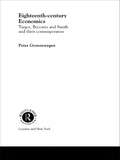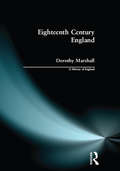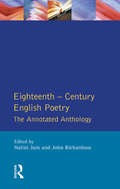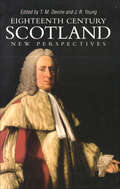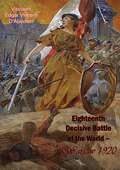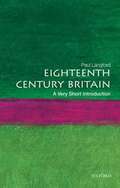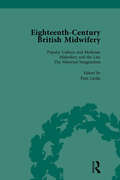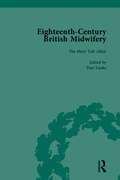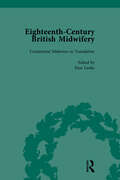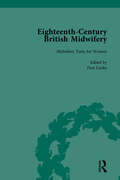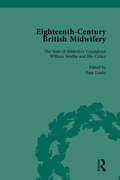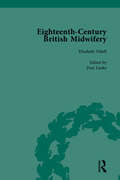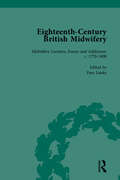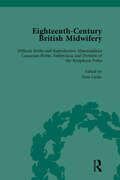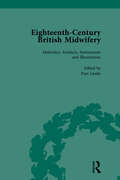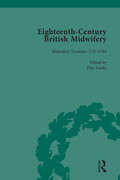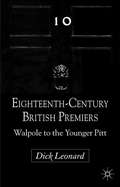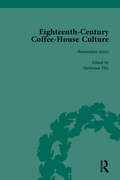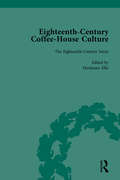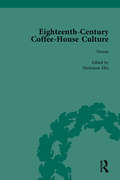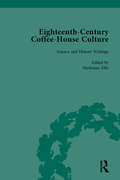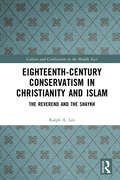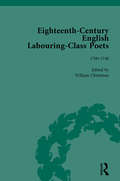- Table View
- List View
Eighteenth Century Economics: Turgot, Beccaria and Smith and Their Contemporaries (Routledge Studies In The History Of Economics #55)
by Peter GroenewegenPeter Groenewegen is one of the world's foremost scholars of eighteenth century economics - the era that saw the effective 'mainstreaming' of the discipline in the work of Smith, Turgot and Quesnay. This collection of essays amounts to the definitive guide to eighteenth century economics and is a must for any economist's bookshelves.
Eighteenth Century England (A History of England)
by Dorothy MarshallA standard introduction to the period which has retained its popularity with generations of students
Eighteenth Century English Poetry
by John Richardson Nalini JainThis anthology of 18th-century English poetry is extensively annotated for a new generation of readers. It combines the scope of a period anthology with the detailed annotations of an authoritative single-author edition. Selected poets include John Wilmot, Earl of Rochester, John Dryden, Jonathan Swift, Anne Finch, Countess of Winchilsea, Joseph Addison, Alexander Pope and William Cowper. The guiding principle of the annotation is one of thoroughness: the editors concentrate on works where the meanings have changed, on primary allusions and on relevant details of social and political history.
Eighteenth Century Europe (The Norton History of Modern Europe)
by Isser WolochThe three-quarters of a century between 1715 and 1789 are often seen as the last years of Europe's old order. But a dramatic rise in Europe's population, the agricultural and industrial revolutions in Britain, and the unprecedented challenges of the Enlightenment began to shake the foundations of the old regime well before 1789. Drawing on the best contemporary scholarship, especially the innovations of French social history, Isser Woloch paints an unusually rich and detailed portrait of eighteenth-century European life and society. Among the new topics he covers are the family economy of the poor, popular culture and the circulation of books, changing patterns of crime and punishment, and the social history of military and religious institutions.
Eighteenth Century Scotland: New Perspectives
by T.M. Devine and J.R. YoungThis impressive collection of essays is based on a two-year seminar series of the Research center in Scottish History at the University of Strathclyde. New and original research, as well as historiographical overviews and commentaries, illuminate the study of this formative century in the creation of modern Scotland. Contributors are leading figures in their fields, and the Scottish experience is examined within an international dimension. Topics include Scottish modernization before the Industrial Revolution, the Union of 1707, Scotland and British expansion, Scottish Jacobitism, the Catholic underground, Scottish national identity, the Scottish Enlightenment, urbanization, demographic change, Scottish Gaeldom, Highland estate management and tenant emigration, and Scottish radicalism. Contributors: Thomas M. Devine, John R. Young, Michael Fry, Allan I. Macinnes, James F. McMillan, Alexander Murdoch, Richard J. Finlay, Jane Rendall, Bernard Aspinwall, Ian D. Whyte, Robert E. Tyson, T. C. Smout, Andrew Mackillop, Christopher A. Whatley, Elaine W. McFarland.
Eighteenth Decisive Battle of the World – Warsaw 1920
by Viscount Edgar Vincent D'AbernonAfter the cataclysmic events of the First World War officially ended on the Western Front in 1918, the Democratic Western Powers were still faced with the fallout of the struggle for power in Russia. There was a very real chance that the Communist contagion would transfer across the borders of Russia to Eastern Europe, as it would do some two decades later. Viscount Edgar Vincent D'Abernon was head of the Interallied Mission to Poland and was eye-witness to the struggle in Poland that culminated in the battle for Warsaw that saw the red tide turned back.“The 18th most decisive battle in history...Had the Battle of Warsaw ended with a Bolshevik victory, it would have been a turning point in the history of Europe; as there is no doubt that with the fall of Warsaw, Central Europe would have been left open to Communist propaganda and Soviet invasion.
Eighteenth-Century Britain: A Very Short Introduction
by Paul LangfordWhile the rest of eighteenth-century Europe was embroiled in revolution and unrest, Britain embarked on an era of comparative calm and stability. Two attempts by the Stuarts to reclaim the throne were easily put down, not through the power of the British military, but through the general apathy of the British people, who were just not in the mood to join in the rebellions enjoyed by the American colonies and the French. Also known as the Age of Enlightenment, this was a time for intellectual growth, as improved literacy rates and the introduction of newspapers paved the way for a more educated middle class. This was also an ideal time for the initial flourishing of the British Empire, as Britain took advantage of its rivals' troubles to further its aims abroad. This comprehensive and authoritative guide takes a thematic approach to eighteenth-century history, covering such topics as domestic politics, religious developments and changes to social demographics. It presents a full picture of an era of reform and growth.
Eighteenth-Century British Midwifery, Part I vol 1
by Pam LieskeGives readers an understanding of midwives, midwifery students, and women in labour. This twelve-volume collection comprises pamphlets, treatises, lectures for midwifery students, texts on the establishment of lying-in hospitals, and catalogues of obstetrical apparatuses collected by male-midwives.
Eighteenth-Century British Midwifery, Part I vol 2
by Pam LieskeGives readers an understanding of midwives, midwifery students, and women in labour. This twelve-volume collection comprises pamphlets, treatises, lectures for midwifery students, texts on the establishment of lying-in hospitals, and catalogues of obstetrical apparatuses collected by male-midwives.
Eighteenth-Century British Midwifery, Part I vol 3
by Pam LieskeGives readers an understanding of midwives, midwifery students, and women in labour. This twelve-volume collection comprises pamphlets, treatises, lectures for midwifery students, texts on the establishment of lying-in hospitals, and catalogues of obstetrical apparatuses collected by male-midwives.
Eighteenth-Century British Midwifery, Part I vol 4
by Pam LieskeGives readers an understanding of midwives, midwifery students, and women in labour. This twelve-volume collection comprises pamphlets, treatises, lectures for midwifery students, texts on the establishment of lying-in hospitals, and catalogues of obstetrical apparatuses collected by male-midwives.
Eighteenth-Century British Midwifery, Part II vol 5
by Pam LieskeScholars of the British Enlightenment who study obstetrical history traditionally focus on the rise of the male-midwife and competition between the sexes. This set comprises pamphlets, treatises, lectures for midwifery students, texts on the establishment of lying-in hospitals, and catalogues of obstetrical apparatuses collected by male-midwives.
Eighteenth-Century British Midwifery, Part II vol 6
by Pam LieskeScholars of the British Enlightenment who study obstetrical history traditionally focus on the rise of the male-midwife and competition between the sexes. This set comprises pamphlets, treatises, lectures for midwifery students, texts on the establishment of lying-in hospitals, and catalogues of obstetrical apparatuses collected by male-midwives.
Eighteenth-Century British Midwifery, Part III vol 10
by Pam LieskeBy reprinting in facsimile primary texts on eighteenth-century midwifery and childbirth, this comprehensive twelve-volume collection gives readers a much deeper, more nuanced understanding of midwives, midwifery students, and women in labour.
Eighteenth-Century British Midwifery, Part III vol 11
by Pam LieskeBy reprinting in facsimile primary texts on eighteenth-century midwifery and childbirth, this comprehensive twelve-volume collection gives readers a much deeper, more nuanced understanding of midwives, midwifery students, and women in labour.
Eighteenth-Century British Midwifery, Part III vol 12
by Pam LieskeBy reprinting in facsimile primary texts on eighteenth-century midwifery and childbirth, this comprehensive twelve-volume collection gives readers a much deeper, more nuanced understanding of midwives, midwifery students, and women in labour.
Eighteenth-Century British Midwifery, Part III vol 9
by Pam LieskeBy reprinting in facsimile primary texts on eighteenth-century midwifery and childbirth, this comprehensive twelve-volume collection gives readers a much deeper, more nuanced understanding of midwives, midwifery students, and women in labour.
Eighteenth-Century British Premiers: Walpole to the Younger Pitt
by Dick LeonardFollowing his earlier surveys of 19th and 20th Century British Prime Ministers, Dick Leonard turns his attention to their 18th Century predecessors, including such major figures as Robert Walpole, the Elder Pitt (Lord Chatham), Lord North and the Younger Pitt.
Eighteenth-Century Coffee-House Culture, vol 1: Vol 3
by Markman EllisHelps scholars and students form an understanding of the contribution made by the coffee-house to British and even American history and culture. This book attempts to make an intervention in debates about the nature of the public sphere and the culture of politeness. It is intended for historians and scholars of literature, science, and medicine.
Eighteenth-Century Coffee-House Culture, vol 2: Vol 3
by Markman EllisHelps scholars and students form an understanding of the contribution made by the coffee-house to British and even American history and culture. This book attempts to make an intervention in debates about the nature of the public sphere and the culture of politeness. It is intended for historians and scholars of literature, science, and medicine.
Eighteenth-Century Coffee-House Culture, vol 3: Vol 3
by Markman EllisHelps scholars and students form an understanding of the contribution made by the coffee-house to British and even American history and culture. This book attempts to make an intervention in debates about the nature of the public sphere and the culture of politeness. It is intended for historians and scholars of literature, science, and medicine.
Eighteenth-Century Coffee-House Culture, vol 4: Vol 3
by Markman EllisHelps scholars and students form an understanding of the contribution made by the coffee-house to British and even American history and culture. This book attempts to make an intervention in debates about the nature of the public sphere and the culture of politeness. It is intended for historians and scholars of literature, science, and medicine.
Eighteenth-Century Conservatism in Christianity and Islam: The Reverend and the Shaykh (Culture and Civilization in the Middle East)
by Ralph A. LeoThis book examines the world of religious conservatism in Christianity and Islam through a comparison of two eighteenth-century traditionalist icons, Jonathan Edwards and Muḥammad Ibn 'Abd al-Wahhāb.Spanning the globe from America to Arabia, this book explores the major themes in the lives and works of these most unlikely of bedfellows, the Reverend and the Shaykh. In many ways, Edwards and Ibn 'Abd al-Wahhāb are about as far apart as two figures could possibly be. Without minimizing their very real differences, however, this comparative study finds numerous parallels that beckon even the most conservative of Christians and Muslims to take a second look at their own faith, as well as the faith of the other. The numerous surprising congruences in the worlds of the Reverend and the Shaykh, as well as in their conceptions of God, humanity, and the faith of the other, suggest that we stand much to gain from a reassessment of long-held views that could lead to wholly new patterns of engagement.With implications in diverse fields such as politics, law, philosophy, theology, history, warfare and anthropology, this book unearths striking parallels in Edwards and Ibn 'Abd al-Wahhāb that have heretofore gone unnoticed or largely ignored.
Eighteenth-Century English
by Raymond HickeyThe eighteenth century was a key period in the development of the English language, in which the modern standard emerged and many dictionaries and grammars first appeared. This book is divided into thematic sections which deal with issues central to English in the eighteenth century. These include linguistic ideology and the grammatical tradition, the contribution of women to the writing of grammars, the interactions of writers at this time and how politeness was encoded in language, including that on a regional level. The contributions also discuss how language was seen and discussed in public and how grammarians, lexicographers, journalists, pamphleteers and publishers judged on-going change. The novel insights offered in this book extend our knowledge of the English language at the onset of the modern period.
Eighteenth-Century English Labouring-Class Poets, vol 1
by John Goodridge Simon Kövesi David Fairer Tim Burke William ChristmasPoets of labouring class origin were published in Britain in the 18th and 19th centuries. Some were popular and important in their day but few are available today. This is a collection of some of those poems from the 18th century.
